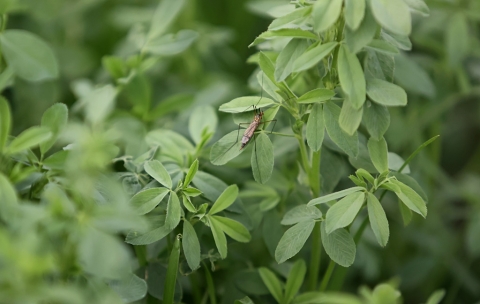TÜBİTAK Endorses OMU's Research on Climate-Resilient Crops
Projects produced at Ondokuz Mayıs University (OMU), a candidate for the title of "Research University," continue to receive support from the Scientific and Technological Research Council of Turkey (TÜBİTAK). Recently, two more projects have been included in the TÜBİTAK 1002 Support Program.
Project for Developing Pepper (Capsicum chinense) Varieties Resistant to High Temperature and Drought Stresses
Within the scope of the TÜBİTAK 1002 Support Program, a project presented by Prof. Dr. Ahmet Balkaya from the Department of Horticulture at OMU's Faculty of Agriculture, focusing on developing pepper varieties resistant to high temperature and drought stresses, has been deemed worthy of support by TÜBİTAK.
The project titled “Morphological, Physiological, and Biochemical Examination of the Resistance Levels of Qualified Pepper Lines (Capsicum chinense) to High Temperature and Drought Stresses” will be carried out by a team consisting of Prof. Dr. Deniz Ekinci from the Department of Agricultural Biotechnology, Prof. Dr. Hakan Arslan from the Department of Agricultural Structures and Irrigation, and Assoc. Prof. Dr. Dilek Kandemir from the Plant and Animal Production Department at Samsun Vocational School. Agricultural Engineer Fatih İpek will also participate as a scholarship holder in the project.
The project aims to identify the high temperature and drought stress-resistant/tolerant lines of qualified C. chinense, which have previously been morphologically and molecularly characterized, and to evaluate them in the pepper rootstock breeding program. The greenhouse trials of the project will be conducted in the research and development (R&D) greenhouses of Petektar Tohumculuk, a local company in Antalya, in collaboration with Agricultural Engineer Büşra Yapıcı as part of the university-industry cooperation.
Project for Developing Radish Varieties Resistant to Low Temperature
Another project, led by Assoc. Prof. Dr. Dilek Kandemir from Samsun Vocational School, with Prof. Dr. Ahmet Balkaya from the Faculty of Agriculture as a researcher and Melek Nur Özdemir as a scholarship holder, focusing on developing radish varieties resistant to low temperature, has also been included in the TÜBİTAK 1002 Support Program.
The supported project is titled "Physiological and Biochemical Examination of the Resistance Levels of Local Radish Genetic Resources to Low Temperature, and Comparison of the Performances of Genotypes Determined as Tolerant/Resistant and Sensitive to Low Temperature in Autumn and Winter Cultivation."
This project is planned to identify the parents of local hybrid radish varieties that are tolerant to low temperatures and suitable for late autumn and winter cultivation using our country's local radish genetic resources. In this way, the aim is to develop low-temperature-tolerant hybrid radish varieties and produce local hybrid radish seeds in collaboration with universities and the private sector in the future.
OMU congratulates our academics and their colleagues and hopes their projects will significantly benefit our country's agriculture.



















